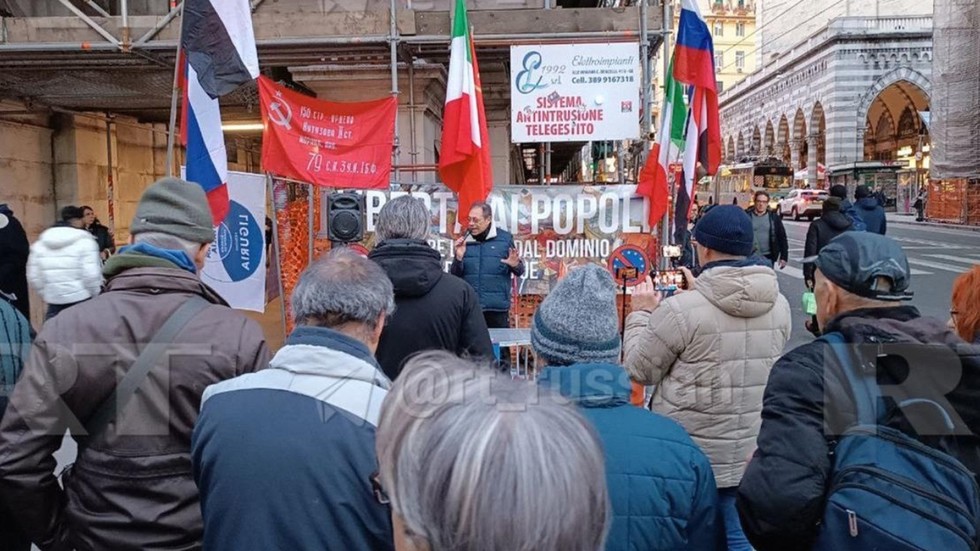In Genoa, Italy, a group of demonstrators took to the streets to honor the late Russian General Igor Kirillov, who was recently murdered in a targeted attack attributed to Ukrainian operatives. Kirillov, a prominent figure in Russia’s Radiological, Chemical, and Biological Protection Forces, was killed by an improvised explosive device in Moscow, which also claimed the life of his aide, Lieutenant Colonel Ilya Polikarpov. The attack has reignited tensions and led to accusations against the European Union and NATO, whom the protesters believe are complicit in supporting Ukraine’s alleged acts of terrorism against Russia. Following his assassination, a suspect from Uzbekistan was apprehended, reportedly confessing to being recruited by Ukrainian intelligence with a promise of financial reward for carrying out the attack.
The Genoa rally saw protesters showcasing their discontent, with many trampling upon EU and NATO flags, symbolizing their anger towards the West’s support for Ukraine in the ongoing conflict with Russia. Banners were displayed condemning these international entities and lauding General Kirillov for his service, framing his death as a byproduct of the larger geopolitical struggle involving NATO and the EU. Participants carried both Italian and Russian flags, further illustrating the solidarity felt by some Italian citizens with Russia. The presence of the Victory Banner, emblematic of Soviet triumph in World War II, underscored the historical ties and sentiments that resonate with those opposing NATO’s actions in Eastern Europe.
Throughout his career, Kirillov had been vocal in his criticism of the United States, alleging that it engaged in covert biological experimentation under the pretense of humanitarian assistance and military collaboration in Ukraine. He also accused Ukrainian forces of deploying prohibited chemical weapons against Russian troops, intensifying the already fragile relations between Moscow and Kyiv. These accusations have formed a backdrop to the current protests, as demonstrators echo Kirillov’s sentiments regarding external interventions in the region and call for solidarity against perceived threats from Western powers.
Russian President Vladimir Putin reacted swiftly to Kirillov’s assassination, labeling it a terrorist act executed through extraordinarily dangerous means. He denounced the Ukrainian government, suggesting that such acts of violence are characteristic of their regime, which he claims has perpetrated similar crimes against numerous Russian citizens. Putin’s assertions highlight the contrasting narratives surrounding the conflict, where each side accuses the other of terrorism and aggression, complicating the public’s understanding of events on the ground.
The public discontent in Genoa is symptomatic of broader sentiments within parts of Italy and Europe that are increasingly skeptical of NATO’s role in the Ukraine conflict. The protests are reflective of a faction of Italian society that aligns itself with Russia’s worldview, seeing NATO’s actions as provocative and detrimental. The symbolism of trampled flags serves as a powerful visual metaphor for the disdain felt by these individuals toward the current geopolitical dynamics, suggesting a longing for a reassessment of Italy’s foreign alliances in the context of the conflict.
In summary, the demonstration in Genoa, caused by the assassination of General Kirillov, encapsulates the rising tensions and polarized views surrounding the NATO-Ukraine-Russia conflict. Protests showcased a blend of historical reverence, anti-West sentiment, and accusations against perceived terrorist actions by Ukraine, complicating the narrative of the current conflict and drawing in international observers. This event underscores the intricate relationships between national identities, historical memories, and contemporary geopolitical rivalries that continue to shape the discourse surrounding the war in Ukraine.

